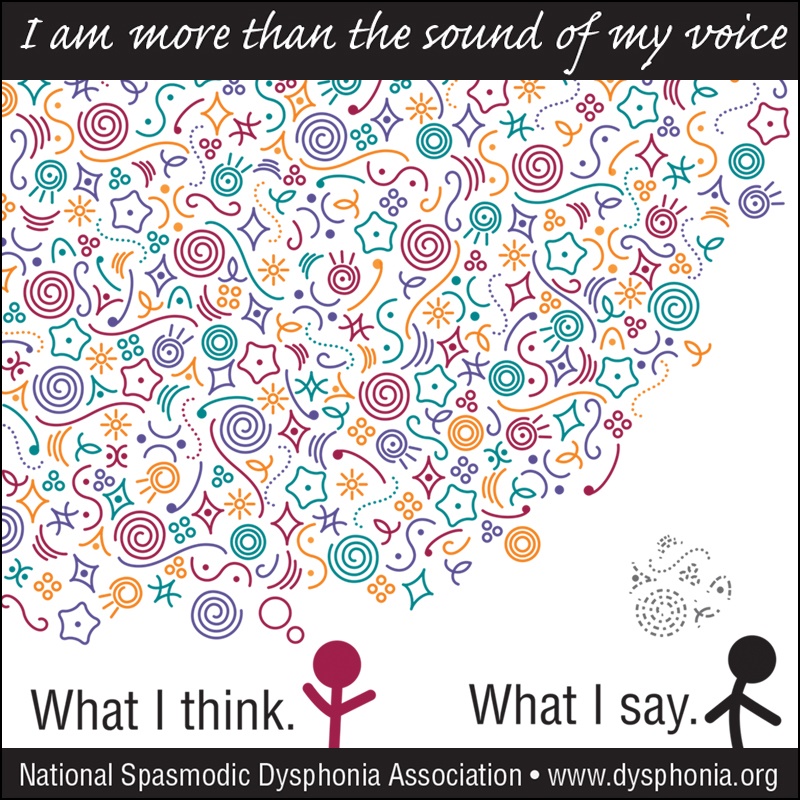Your voice is an important part of who you are. The impact of losing your “normal” voice may spill over into other aspects of your life.
Your voice is important because you use it countless times throughout the day to convey information, share your emotions, succeed in your career, feel good about yourself and interact with your family, friends, and the rest of society. So it’s no wonder that when spasmodic dysphonia or some other condition strikes, and your voice feels like it is failing you, that you would feel an overwhelming personal impact.
People whose vocal cords operate normally seldom consider how their voice functions for the simple day-to-day matters. But for someone with SD, many interactions you didn’t think twice about before, may become more difficult or less enjoyable. Anxiety might arise from the lack of dependability of your voice, causing frustration. You start to wonder:
- Will I be able to speak clearly enough to be heard at a drive-thru?
- Should I stay away from the crowded store and ask a friend to return something for me instead?
- When the phone rings, will I even be able to say hello clearly?
- If I was alone and in trouble, could I even get the word ‘Help’ out when I needed it?
There are so many raw emotions as you are going through these changes. You might even feel sad remembering how much easier life used to be when we didn’t have to think about these things.

Communication might feel more challenging
While mundane tasks can be frustrating, it does not compare to not being able to express your thoughts and feelings because your voice is not cooperating. Having to continually repeat yourself or even worse, being sidelined in a conversation because you cannot be heard is so gut-wrenching. Your weak voice might mean you do not get full attention in a group setting or that people might interrupt you or just not listen. This frustration could turn into resignation or withdrawal. But remember, it doesn’t have to.
Social interaction may be difficult
When your voice inhibits your ability to communicate and relate to others, it can feel like a wedge is being driven between you and your community and changing your sense of belonging.
If you’re scared or embarrassed about how you sound, afraid of being misconstrued, frustrated at having to repeat yourself, and tired that you have to think so hard to speak, you might feel withdrawing. This is particularly true before being diagnosed, when you don’t know what’s wrong.
“After hearing ourselves for a period of time, we come to believe in some way that maybe we are nervous, lacking in confidence, frightened, withdrawn…the sound of our own voice helps to reinforce our self-perception and self-acceptance.”
— June
Your career can be impacted
The impact of your voice on communication might become more noticeable in the workplace. Without a strong confident voice, moving up in the career ladder could be challenging and depending on your role, your current job could be almost impossible to maintain. Almost one-quarter of people with SD undergo a career change as a result of their voice. Your voice disorder can affect economic opportunities and more importantly, a job loss because of your voice can damage your self-confidence.
Your personal identity can be challenged
The onset of SD can make you feel like your voice is being scrambled without your permission. This just doesn’t sound like you and because you have no say in the matter, the change seems dramatic. And since so much of your self-esteem and self-image is based on other’s reactions, your discomfort in yourself might be magnified. The biggest challenge is likely to happen before diagnosis.
With feelings of inadequacy and vulnerability increasing, you may become more sensitive about others’ reactions to our voices. You’re more sensitive when someone asks if you are sick for the 50th time. You may become fixated on your voice, thinking about it all the time, possibly affecting your self- confidence. It’s a vicious cycle.
You might feel grief over the loss of your voice
Losing your normal voice to SD is a major life event and you’re might go through stages of grief similar to what happens with the loss of a loved one, the loss of your job or diagnosis of a major illness. This is not unusual. Read about these steps.
Even though it may all seem bad, what you’re feeling is normal!
You may experience some of these struggles, and they are reactions that others have shared in coping with loss of voice. But remember, your voice does not have to define you. And this is an opportunity to rebuild your self-image, to accept what you cannot change, and to revitalize yourself.
In the book, “Easier Done than Said: Living with a Broken Voice“, author Karen Adler Feeley references the Six Steps to Acceptance, a place where you can start to find healing. Living with this vocal challenge might surprise yourself in ways you did not expect. It can provide a different perspective, help you develop great listening skills and build empathy.
And while it can have huge personal impact, your approach and attitude will shape where you go next. Hopefully, by educating yourself and having the right tools, you can move beyond the limitations. Click here to visit a page full of resources to help empower you, and getting you back to your amazing self. And remember you are not alone in this journey.


